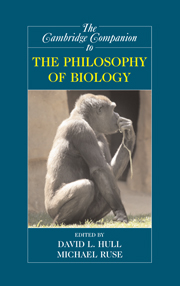Book contents
- Frontmatter
- 1 Adaptation
- 2 Population Genetics
- 3 Units and Levels of Selection
- 4 What’s Wrong with the Emergentist Statistical Interpretation of Natural Selection and Random Drift?
- 5 Gene
- 6 Information in Biology
- 7 Reductionism (and Antireductionism) in Biology
- 8 Mechanisms and Models
- 9 Teleology
- 10 Macroevolution, Minimalism, and the Radiation of the Animals
- 11 Philosophy and Phylogenetics: Historical and Current Connections
- 12 Human Evolution: The Three Grand Challenges of Human Biology
- 13 Varieties of Evolutionary Psychology
- 14 Neurobiology
- 15 Biological Explanations of Human Sexuality: The Genetic Basis of Sexual Orientation
- 16 Game Theory in Evolutionary Biology
- 17 What Is an ‘Embryo’ and How Do We Know?
- 18 Evolutionary Developmental Biology
- 19 Molecular and Systems Biology and Bioethics
- 20 Ecology
- 21 From Ecological Diversity to Biodiversity
- 22 Biology and Religion
- 23 The Moral Grammar of Narratives in History of Biology: The Case of Haeckel and Nazi Biology
- Reference List
- Index
- Series List
23 - The Moral Grammar of Narratives in History of Biology: The Case of Haeckel and Nazi Biology
Published online by Cambridge University Press: 28 April 2008
- Frontmatter
- 1 Adaptation
- 2 Population Genetics
- 3 Units and Levels of Selection
- 4 What’s Wrong with the Emergentist Statistical Interpretation of Natural Selection and Random Drift?
- 5 Gene
- 6 Information in Biology
- 7 Reductionism (and Antireductionism) in Biology
- 8 Mechanisms and Models
- 9 Teleology
- 10 Macroevolution, Minimalism, and the Radiation of the Animals
- 11 Philosophy and Phylogenetics: Historical and Current Connections
- 12 Human Evolution: The Three Grand Challenges of Human Biology
- 13 Varieties of Evolutionary Psychology
- 14 Neurobiology
- 15 Biological Explanations of Human Sexuality: The Genetic Basis of Sexual Orientation
- 16 Game Theory in Evolutionary Biology
- 17 What Is an ‘Embryo’ and How Do We Know?
- 18 Evolutionary Developmental Biology
- 19 Molecular and Systems Biology and Bioethics
- 20 Ecology
- 21 From Ecological Diversity to Biodiversity
- 22 Biology and Religion
- 23 The Moral Grammar of Narratives in History of Biology: The Case of Haeckel and Nazi Biology
- Reference List
- Index
- Series List
Summary
In his inaugural lecture at Cambridge as Regius Professor of Modern History in 1895, Lord John Acton urged that the historian deliver moral judgments on the figures of his research. Acton declaimed: “I exhort you never to debase the moral currency or to lower the standard of rectitude, but to try others by the final maxim that governs your own lives and to suffer no man and no cause to escape the undying penalty which history has the power to inflict on wrong.” (Acton 1906, 234) / In 1902, the year after Acton died, the president of the American Historical Association, Henry Lea, in dubious celebration of his British colleague, responded to the exordium with a contrary claim about the historian's obligation, namely, objectively to render the facts of history without subjective moralizing. Referring to Acton's lecture, Lea declared: “I must confess that to me all this seems to be based on false premises and to lead to unfortunate conclusions as to the objects and purposes of history, however much it may serve to give point and piquancy to a narrative, to stimulate the interests of the causal reader by heightening lights and deepening shadows, and to subserve the purpose of propagating the opinions of the writer.” (Lea 1904, 234)
- Type
- Chapter
- Information
- The Cambridge Companion to the Philosophy of Biology , pp. 429 - 452Publisher: Cambridge University PressPrint publication year: 2007
- 2
- Cited by



